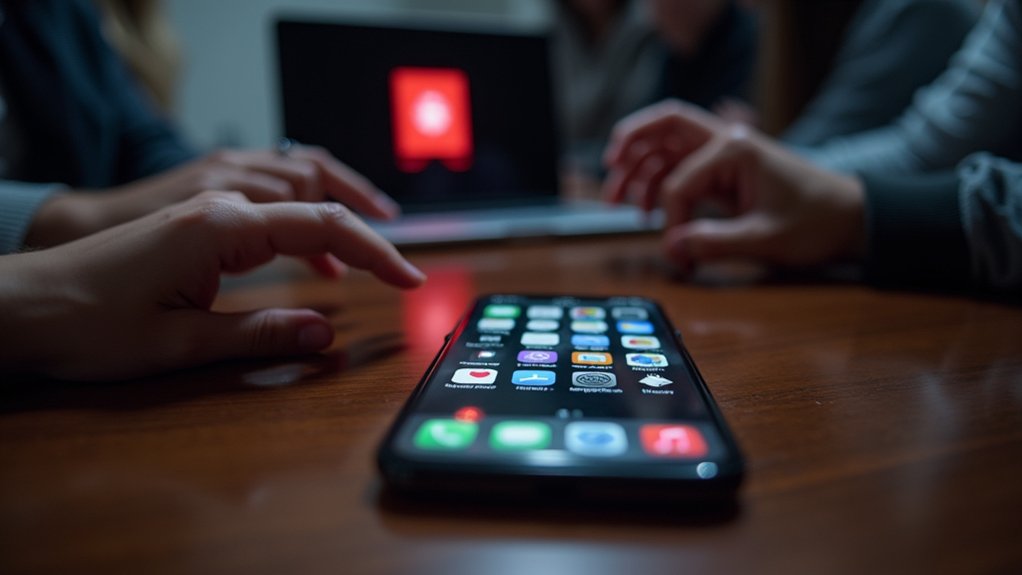
How to reset apple ID password
Unlock your Apple ID with ease—discover the essential steps to reset your forgotten password, but there’s one crucial detail you can’t miss.


You depend on your iPhone every day, so it’s concerning when something seems amiss. Perhaps you’ve noticed unexpected pop-ups, or your iPhone battery seems to drain faster than usual. These could be signs that your iPhone isn’t as secure as you think. Before dismissing it as a simple glitch, consider what these changes might really mean. If you’re curious about other signs of an iPhone virus, there’s more you should know about iPhone security. By staying informed, you can ensure your iPhone remains safe and functional.

If you notice unexpected pop-ups and ads on your iPhone, even when you’re not browsing the web, it might be a sign of a virus or malware.
These pesky interruptions can appear on your home screen or within trusted apps. You might see alerts pushing you to click suspicious links or download unfamiliar apps.
Don’t overlook these signs—they often point to malicious software on your device. Being aware of these pop-ups and ads can help you safeguard your iPhone from potential threats.
Stay informed and keep your smartphone secure from unwanted pop-ups and ads.
If you’ve noticed your iPhone’s battery draining rapidly, it could be more than just power-hungry apps causing the issue.
Even without running new applications, a sudden drop in battery life might indicate malware working in the background. Malware can secretly engage your phone in unwanted tasks, consuming extra resources and leading to rapid battery drain.
Keep an eye out for unexpected pop-ups and ads, as these could be signs of malicious software affecting your smartphone’s performance.
If you’ve noticed a sudden spike in your iPhone’s data usage, it might be a sign that something unusual is happening behind the scenes.
Mobile data depleting faster than expected, even without any change in your daily habits, can often indicate that malware might be running in the background. These pesky viruses frequently use your connection to send information or download unwanted content, leading to increased data usage.
To safeguard your mobile data, regularly check your data usage in Settings. This will help you spot any suspicious activity or unexplained surges in your iPhone’s data usage, ensuring you stay in control of your smartphone’s performance.
Is your iPhone’s app performance not up to par? If your apps are crashing or freezing more than usual, it could be a sign that something isn’t right under the hood.
While occasional app glitches are normal, frequent or persistent crashes may indicate malware affecting your smartphone’s usual functions.
If force-closing or reinstalling apps doesn’t resolve the issue, you might be facing a deeper problem.
Don’t overlook these app disruptions—they could be a sign of a virus. Stay vigilant and ensure your device’s health by addressing these app crashes promptly.
If you’re noticing mysterious charges on your credit card or discovering purchases you never made in your App Store history, it’s time to take a closer look at your iPhone.
Unusual app behavior can be a red flag that your device might be compromised. Viruses or malicious apps can access your payment information, potentially leading to fraudulent transactions.
To safeguard your finances, regularly check your credit card statements and review your App Store purchase history. By doing so, you can quickly catch any suspicious financial activities related to your iPhone.
Stay vigilant and protect your smartphone from unauthorized access to ensure a safe and secure experience.
If your iPhone feels hot even when you’re not using it heavily, that’s a warning sign you shouldn’t ignore.
Overheating without cause can be alarming and may indicate underlying issues you need to address. Viruses or malware often run processes in the background, making your device overheat for no clear reason.
If you’ve ruled out demanding apps or a hot environment, persistent overheating could point to a virus using your phone’s resources without your consent.
Don’t dismiss this symptom. It’s essential to identify the root cause of overheating to ensure your smartphone remains in optimal condition.
Expecting your iPhone’s settings to remain unchanged is a given, but if you notice sudden and unexplained changes to your iPhone’s settings, it could be a sign of trouble.
Whether it’s the Wi-Fi turning on by itself, unfamiliar profiles popping up, or altered privacy settings, these are red flags that shouldn’t be ignored. Such unauthorized changes to settings could be due to viruses or malicious apps that manipulate settings to compromise your data or security.
Always keep an eye on your iPhone’s settings, and act quickly if anything seems off. By staying vigilant and regularly reviewing your iPhone’s settings, you can protect your data and ensure your smartphone operates smoothly.
If you notice any of these seven signs—such as strange pop-ups, rapid battery drain, or apps crashing—it might indicate your iPhone has a virus. Don’t overlook these red flags! Taking swift action is essential to protect your data and privacy. Start by updating your iPhone software, deleting any suspicious apps, and considering a device scan to root out the issue.
Staying alert to these warning signs helps ensure your iPhone remains virus-free and operates smoothly. By doing so, you can confidently use your iPhone knowing that your personal information is safe and secure. Remember, keeping your iPhone virus-free is crucial for a seamless smartphone experience.

Unlock your Apple ID with ease—discover the essential steps to reset your forgotten password, but there’s one crucial detail you can’t miss.

Plagued by malware, your computer could suffer more than you realize—prepare to uncover the unexpected consequences lurking beneath the surface.

Missing these top 5 password mistakes could put your accounts at risk—are you making one without even realizing it?

Uncover the safest way to remove a Trojan virus from your Mac before it causes serious damage—there’s one crucial step you can’t afford to miss.

Thinking your iPhone might be infected with malware? Discover the crucial manual checks you need to perform before your data is at risk.

Just noticed your phone acting strangely? Discover the five warning signs it might be hacked—number three will definitely surprise you.